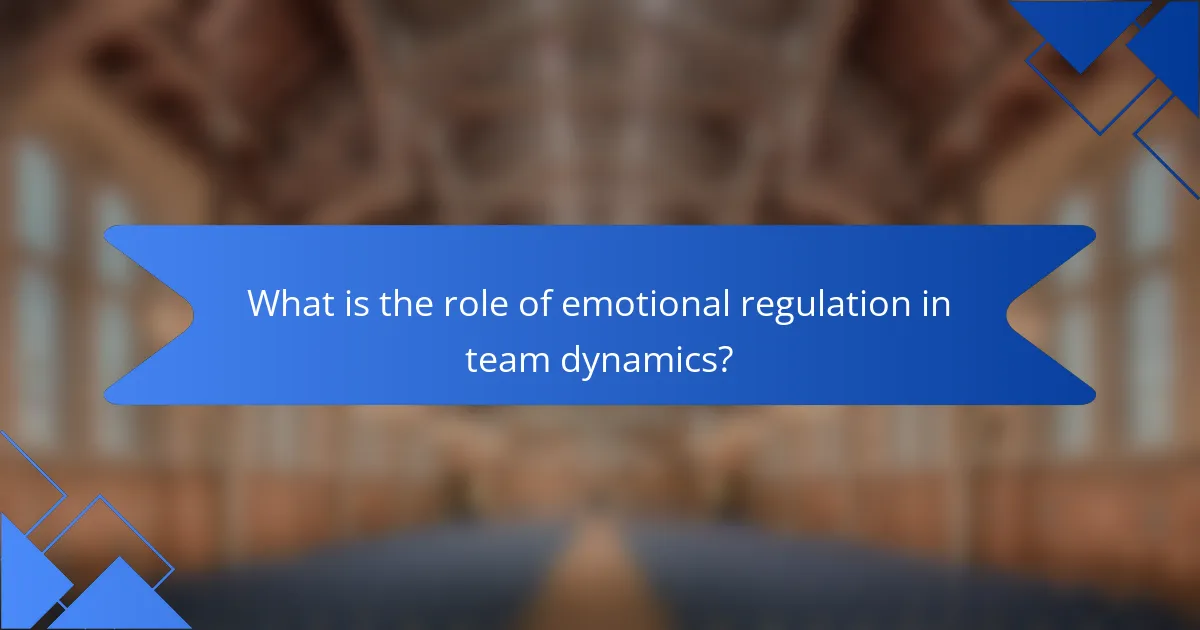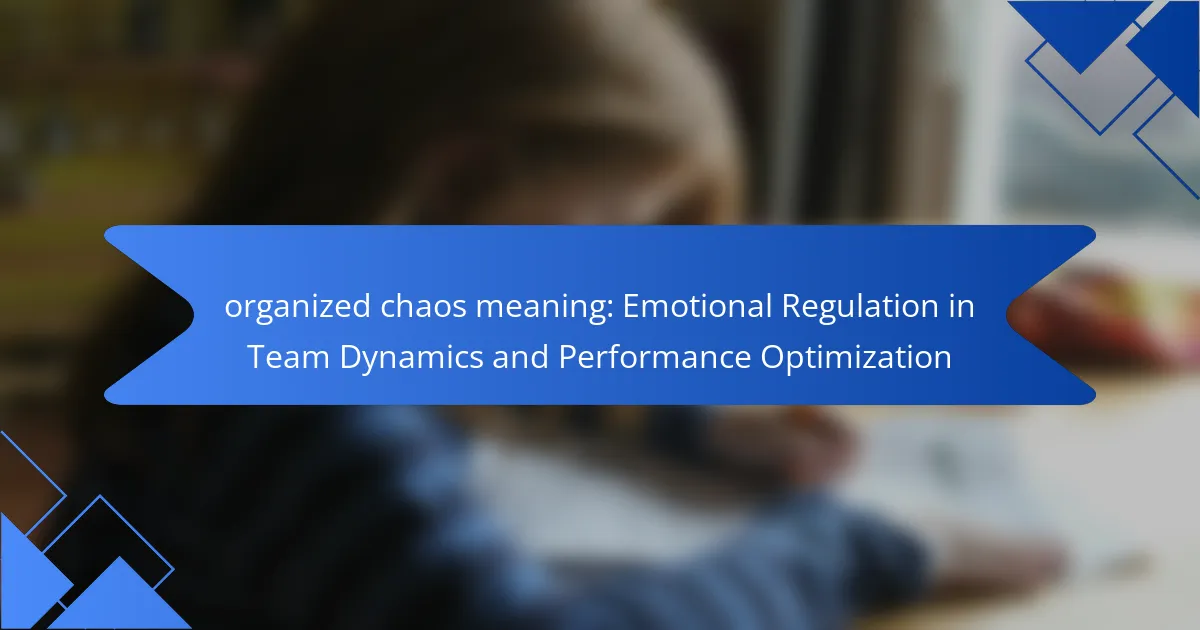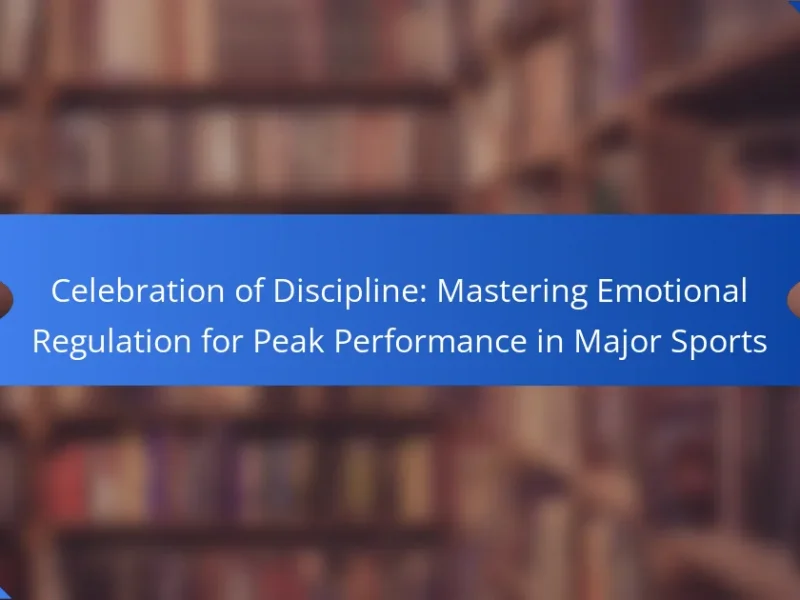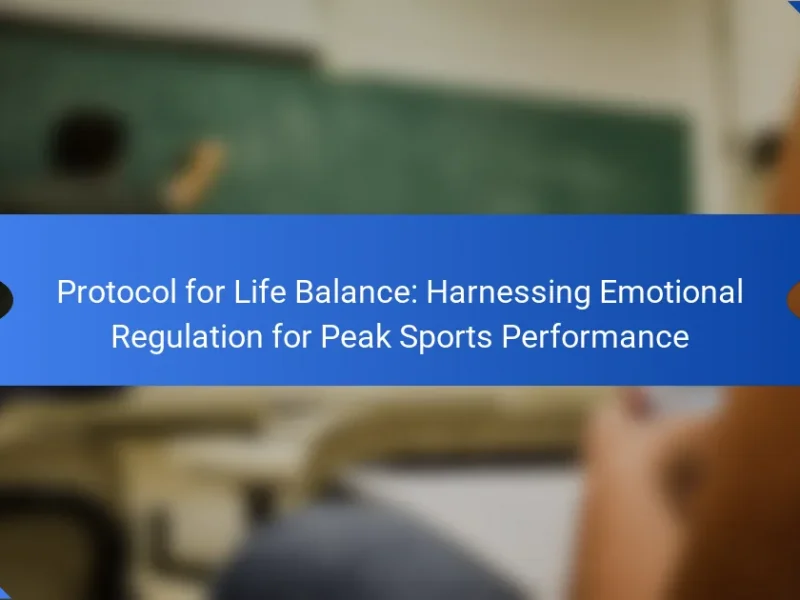Emotional regulation is vital for enhancing team dynamics and optimizing performance. Effective emotional management fosters collaboration, improves communication, and builds trust among team members. It also boosts morale and resilience, enabling teams to adapt to challenges. By understanding organized chaos, teams can create a positive work environment that drives productivity and job satisfaction.

What is the role of emotional regulation in team dynamics?
Emotional regulation plays a crucial role in team dynamics by fostering collaboration and enhancing performance. Teams that effectively manage emotions can navigate conflicts, maintain focus, and boost morale. This regulation leads to improved communication and trust among team members, which are essential for achieving collective goals. Moreover, teams with high emotional regulation demonstrate resilience, adapting better to challenges and changes. This unique attribute significantly influences overall productivity and job satisfaction, creating a positive work environment conducive to success.
How does emotional regulation impact performance optimization?
Emotional regulation significantly enhances performance optimization by fostering a positive team environment. Teams with effective emotional regulation demonstrate improved communication, collaboration, and conflict resolution. This leads to higher productivity and innovation. Moreover, emotionally regulated teams can adapt better to stress, maintaining focus and motivation even during challenging situations. As a result, emotional regulation serves as a unique attribute that directly influences overall team dynamics and performance outcomes.
What are the key components of emotional regulation systems?
Effective emotional regulation systems in teams involve self-awareness, emotional intelligence, and adaptive coping strategies. Self-awareness allows team members to recognize their emotions and triggers. Emotional intelligence facilitates understanding and managing both personal and others’ emotions. Adaptive coping strategies enable teams to respond constructively to stress, fostering resilience and collaboration. These components collectively enhance team dynamics and optimize performance.
What techniques enhance emotional awareness among athletes?
Techniques that enhance emotional awareness among athletes include mindfulness practices, open communication, and reflective journaling. Mindfulness helps athletes stay present and recognize their emotions. Open communication fosters trust and understanding within teams, allowing members to express feelings freely. Reflective journaling encourages self-exploration and identification of emotional triggers. These methods collectively improve emotional regulation, enhancing team dynamics and performance optimization.
How do communication styles affect emotional regulation?
Communication styles significantly influence emotional regulation within teams. Effective communication fosters a supportive environment, enhancing emotional stability and performance. Teams with diverse communication styles can experience organized chaos, where varied perspectives lead to innovative solutions. Conversely, misaligned communication can heighten stress and conflict, undermining emotional regulation. Understanding these dynamics allows teams to optimize performance by leveraging individual strengths while maintaining coherence. Emphasizing clarity and empathy in communication can mitigate emotional turbulence, promoting a balanced team dynamic.
What are the universal attributes of emotional regulation in sports?
Emotional regulation in sports encompasses self-awareness, impulse control, emotional expression, and social support. These universal attributes enhance team dynamics and optimize performance. Self-awareness allows athletes to recognize their emotional states, while impulse control helps manage reactions during high-pressure situations. Emotional expression fosters communication, and social support strengthens team cohesion. Together, these attributes contribute to a balanced and effective team environment.
How do unique emotional regulation strategies vary by sport?
Unique emotional regulation strategies vary by sport, influenced by team dynamics and performance optimization needs. In team sports like football, athletes often use collective emotional strategies, fostering group cohesion to manage stress. Conversely, in individual sports like tennis, athletes may rely on personal techniques, such as visualization or self-talk, to regulate emotions effectively.
In basketball, quick emotional adjustments are crucial due to fast-paced gameplay, leading players to develop rapid response techniques. In contrast, sports like rowing emphasize synchronized emotional regulation, where team members must align their emotional states for optimal performance.
Understanding these variations enables coaches and athletes to tailor emotional strategies, enhancing overall team performance and individual resilience.
What specific approaches are used in basketball versus football?
Basketball emphasizes quick decision-making and emotional regulation due to its fast-paced nature, while football focuses on maintaining composure over longer periods. In basketball, players often engage in rapid interactions, requiring immediate emotional responses to maintain team dynamics. Conversely, football players must regulate emotions over extended play, managing stress during slower, strategic phases. This distinction influences performance optimization strategies in each sport, highlighting the unique emotional regulation techniques tailored to their specific dynamics.
What rare attributes influence emotional regulation in high-pressure situations?
Emotional regulation in high-pressure situations is influenced by rare attributes such as adaptability, resilience, and team cohesion. Adaptability allows individuals to adjust their emotional responses based on changing dynamics. Resilience fosters the ability to recover from setbacks, maintaining performance under stress. Team cohesion enhances emotional support, enabling members to share and manage emotions collectively, which optimizes overall team performance.
How can teams cultivate a culture of organized chaos?
Teams can cultivate a culture of organized chaos by embracing flexibility and encouraging open communication. This approach allows members to express creativity while maintaining focus on goals. Emotional regulation is crucial; it helps manage stress and fosters resilience. Regular feedback sessions can enhance trust and collaboration, leading to optimized performance. Establishing clear roles within this chaotic environment ensures accountability, while adaptability allows teams to respond to challenges effectively.
What are the best practices for implementing emotional regulation systems?
To implement emotional regulation systems effectively, prioritize clear communication and team training. Establish protocols for recognizing and addressing emotional triggers. Foster a supportive environment that encourages open dialogue about feelings. Regularly evaluate the system’s impact on team dynamics and performance.
What common mistakes should teams avoid in emotional regulation?
Teams should avoid common mistakes in emotional regulation, such as ignoring emotions, failing to communicate openly, and neglecting individual differences. These errors can lead to misunderstandings and decreased performance. Acknowledging emotions fosters a supportive environment, while open communication enhances team cohesion. Recognizing unique emotional responses allows for tailored strategies, improving overall dynamics and effectiveness.
How can coaches effectively support emotional regulation in athletes?
Coaches can effectively support emotional regulation in athletes by fostering a safe environment, teaching coping strategies, and promoting open communication. A supportive atmosphere encourages athletes to express emotions without fear. Incorporating techniques such as mindfulness and breathing exercises can enhance self-awareness and emotional control. Regular team meetings facilitate discussions about emotional challenges, reinforcing team dynamics and trust.
What expert insights can enhance emotional regulation strategies?
Expert insights can significantly enhance emotional regulation strategies in team dynamics. Implementing structured feedback mechanisms fosters open communication, allowing team members to express emotions constructively. Training sessions focused on emotional intelligence improve awareness and management of emotions. Additionally, incorporating mindfulness practices helps individuals remain present, reducing stress and enhancing focus. Utilizing conflict resolution frameworks can guide teams in navigating emotional challenges effectively, promoting a healthier work environment. These strategies collectively optimize performance and strengthen team cohesion.


